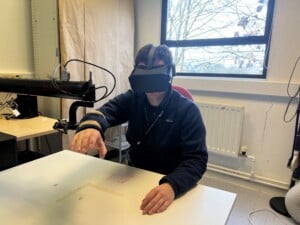Research
Using Virtual Reality (VR) and sensory feedback-assisted rehabilitation to manage chronic shoulder pain




The winner of this year’s Inspiration Fund is a project researching Virtual Reality (VR) and sensory feedback–assisted rehabilitation for the management of chronic shoulder pain. The project is developed through a partnership between the Royal National Orthopaedic Hospital (RNOH) and the UCL Aspire Centre for Rehabilitation Engineering and Assistive Technology (Aspire CREATe) at the UCL Institute of Orthopaedics.
The team behind the project have a multi-disciplinary background in physiotherapy, rehabilitation technologies, immersive VR and robotic technologies. This includes Ms Anju Jaggi who is a Consultant Shoulder Physiotherapist/ Clinical Director of Therapies at the RNOH and Prof Rui Loureiro, Professor of Surgical and Rehabilitation Engineering and Head of UCL Institute of Orthopaedics. They are investigating the feasibility of immersive VR technology as an affordable NHS intervention for people with chronic shoulder pain who are referred for conservative management, including but not limited to shoulder instability, rotator cuff injuries and shoulder impingement.
Shoulder pain is the third most common MSK condition seen within primary care. Commonly prescribed surgery and physiotherapy do not lead to improvements for all patients. However, there is growing research into the use of VR to treat different pain conditions, especially where this combines visual and sensory (haptic) technologies. These influence the ways in which the brain associates pain with joint movement; for example, patients using the technology can undertake far greater movement than they think they are capable of because the VR technology tricks or distracts their brains into thinking that they are only moving their joints within their pain threshold.
The immersive VR intervention may also improve patient engagement with rehab. According to Dr Rokhsaneh Tehrany, Therapies Research Lead (RNOH)/Honorary Senior Researcher at UCL, ‘One of the reasons why conservative management for shoulder pain isn’t always effective is because it involves good engagement with prescribed exercises. So, enhancing the fun element through VR could deliver significant benefits. Many of the patients we see at the Royal National Orthopaedic Hospital have complex injuries and conditions and may have reached a point where then their pain isn’t improving. This new therapy is therefore really exciting because we may have the potential to offer these patients new options. We’re not saying that VR is going to replace traditional treatments, but the use of immersive VR assisted exercise will be an adjunct and optimise our management strategies, including within patient’s homes in the future.’
The study is an extension of a long-standing project led by Professor Rui Loureiro, his team (including Dr Peter Snow) has been working on the use of robot technologies for rehabilitation for over two decades. Professor Loureiro explains how they began, ‘We started developing robot technologies to enhance neuroplasticity for stroke rehab. Instead of a physiotherapist moving their arms, the robot helped patients engage in activities to promote neuroplasticity and reform neural connections. We subsequently combined robotics with immersive VR, and with Dr Peter Snow we delivered a first-in-man clinical study to help alleviate phantom limb and neuropathic pain. This system combining immersive VR and haptic technologies is unique and the only one in the world. When people talk about VR, they talk about the use of headsets to immerse people in a different world. We go one step further because we provide haptic feedback as patients interact with their environment – they can feel the physical properties of virtual objects, such as geometry, weight, collisions with virtual objects and friction associated with objects’ interactions.’
The project has received funding for one year from ORUK for the research team to undertake a feasibility study with a small group of patients. Dr Tehrany says, ‘Once we complete that work, hopefully around summer next year, we’ll have an idea of whether a future study is feasible. And if so, this initial study will inform a new funding application for a larger trial within two to three years of this initial feasibility work’.
In the long-term, the team would like to see the systematic use of VR becoming more widely applied to MSK rehabilitation. According to Professor Loureiro, ‘If we find that the patient’s acceptance of the VR intervention is good and there’s a positive impact on their pain management, we will move on to longer-term studies looking at optimising the interventions, integrating these technologies at the point of care in the NHS and potentially looking at how can we make the technology affordable enough to be used in people’s homes.’
To find out more about the project:
Follow:
In the media:
Virtual reality: how technology can help amputees, Channel 4 News
How Technological Advancements Boost Recovery, Wellcome Centre for Human Neuroimaging
Relevant publications
Snow, P. W., Dimante, D., Sinisi, M., & Loureiro, R. C. V. (2022). Virtual Reality combined with Robotic facilitated movements for pain management and sensory stimulation of the upper limb following a Brachial Plexus injury: A case study. IEEE International Conference on Rehabilitation Robotics (ICORR).
Snow, P. W., Sedki, I., Sinisi, M., Comley, R., & Loureiro, R. C. V. (2017). Robotic therapy for phantom limb pain in upper limb amputees. 2017 International Conference on Rehabilitation Robotics (ICORR). IEEE. doi:10.1109/ICORR.2017.800938
Griffin J, Chester R, Daniell H, Jaggi A. A systematic review to compare physiotherapy treatment programmes for atraumatic shoulder instability. Shoulder & Elbow 2022 https://doi.org/10.1177/17585732221080730
Coyle M, Weatherburn L, Jaggi A, Chester R. Post-Operative Rehabilitation following Traumatic Anterior Shoulder Dislocation: A Systematic Scoping Review. Submitted to Shoulder & Elbow 2022 https://doi.org/10.1177/17585732221089636
If we find that the patient’s acceptance of the VR intervention is good and there’s a positive impact on their pain management, we will move on to longer-term studies looking at optimising the interventions, integrating these technologies at the point of care in the NHS and potentially looking at how can we make the technology affordable enough to be used in people’s homes.

Professor Rui Loureiro
Professor of Surgical and Rehabilitation Engineering and Head of UCL Institute of Orthopaedics
